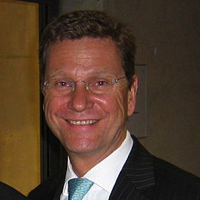On Sunday, Guido Westerwelle announced his resignation as German vice chancellor and leader of the Free Democratic Party (FDP), the junior partner in Chancellor Angela Merkel's coalition government. Endless disputes had already bogged down Merkel's second administration even before it stumbled in its response to Japan's tsunami-triggered nuclear crisis and its vote on the U.N. resolution imposing a no-fly zone over Libya. Last week, however, the bill came due, and the coalition was trounced in two crucial state elections. Since then, with the FDP in open revolt, the coalition government has been in utter chaos, and the fate of its leaders is now in question.
Germany, where nuclear energy has always been hotly contested, has been more politically affected by the Japanese reactor catastrophe than any other Western country. In 2002, a coalition of the Social Democratic Party (SPD) and the Green Party under then-Chancellor Gerhard Schröder forced through a gradual phase out of all German nuclear reactors by the early 2020s over the opposition of operators -- mostly from Germany energy giants E.on and RWE. Since then, Merkel's conservative Christian Democratic Union (CDU) and the liberal FDP have taken up the cause of revoking the "Atomausstieg" (nuclear phase out). Last year they succeeded in extending the lifespan of most reactors by 14 years. The Fukushima disaster has made this position untenable.
On March 15, a panic-stricken Merkel announced the immediate shutdown of all seven reactors built before 1980 and a three-month moratorium on operating extensions for the remaining nuclear plants. The energy industry and members of her government rose in rebellion against her rushed decision and populist flip-flopping, with RWE announcing plans to file a lawsuit against the government. But hundreds of thousands of demonstrators took to the streets in major German cities to demand a short-term shutdown of all reactors. As a result, Merkel and Westerwelle went into last week's state elections in Baden-Württemberg and Rhineland-Palatinate in an unwinnable position. After having already received a sound beating a week earlier in Saxony-Anhalt, the CDU lost the governorship of Baden-Württemberg, which it had ruled continuously since 1953. For its part, the FDP was annihilated. The "off with their heads" shouts of protest in the FDP became impossible to ignore, and on Sunday Westerwelle submitted to his fate.

